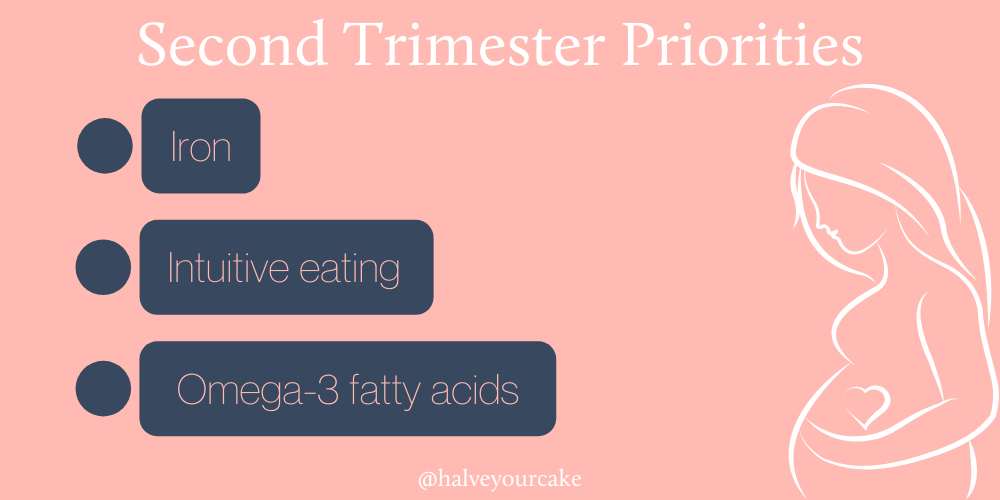Nutrition Priorities By Trimester
In this post, we’re going to discuss basic nutrient needs throughout your pregnancy and how they change through each trimester. During pregnancy, these nutrients are extra important: folic acid, iron, calcium, vitamin D, choline, omega-3 fatty acids, B vitamins, and vitamin C. The easiest way to make sure you are getting adequate amounts for you and baby is by taking a prenatal vitamin AND discussing your individual nutrient status with your prenatal provider. It’s always an option to bring your prenatal vitamin bottle into an appointment with you and have your provider look it over to make sure they are satisfied that it includes all the specific nutrients you need. For a more detailed discussion of prenatal vitamins, you can read our blog post on them here.
First trimester
In your first trimester, things don’t change too much. And let’s be real, it’s a good thing your body (and the growing baby) can survive on just about any combination of foods for a limited time frame, because morning sickness or food aversions may leave you struggling to eat what feels like a normal food intake for weeks. One of your number one priorities during the first trimester should be taking a prenatal vitamin every day, simply feeding yourself adequate nourishment (in whatever form it needs to be) and hydrating sufficiently. Your energy (calorie) needs don’t increase significantly in the first trimester, so there’s no need to intentionally eat extra for the baby. Your body’s hunger and fullness cues may be off due to nausea, so just try and eat the same quantity or frequency as what was normal or average for your pre-pregnancy self. Read more about the first trimester in our Morning Sickness Nutrition post.
The main nutrient we want to highlight during the first trimester is folic acid. Folic acid is a B vitamin that is essential for preventing birth defects of the baby’s brain and spine. These are called neural tube defects. You need at least 600 micrograms of folic acid every day, and it’s uncommon for the average woman to be getting that much from food intake. Because folic acid becomes important right away when you become pregnant, it’s a good idea to be taking a basic prenatal vitamin regularly during any time in your life when you could become pregnant. The Academy of Obstetrics and Gynecology recommends taking a prenatal vitamin with at least 400 micrograms of folic acid starting a month before a pregnancy might begin. If you didn’t do this, don’t panic. This is simply our encouragement to prioritize taking a prenatal vitamin as soon as possible once you discover you are pregnant (or to start taking one when you begin trying to conceive).
Another nutrient we want to highlight starting right at the beginning of pregnancy is choline. Choline often gets overlooked so we also specifically mentioned it in our Prenatal Vitamins and Supplements post. Choline is not found in many prenatal vitamins but it plays an important role in fetal brain development. You can get choline by eating chicken, beef, eggs, milk, soy products, and peanuts, but to be sure you are getting enough, it’s a good idea to seek out a prenatal vitamin that includes it. During pregnancy you need 450mg/day and it’s estimated that the vast majority of women do not consume this much through foods alone.
Second trimester
During your second trimester, your need for iron and omega-3 fatty acids ramp up. It’s OK to take a prenatal vitamin without iron during your first trimester, but once you hit that second tri, it’s a good idea to switch to a prenatal that contains iron or add a separate iron supplement. You can also discuss your iron status with your prenatal provider to get an idea of how your body’s current iron stores are. Remember that taking an iron supplement may cause constipation, so make sure you drink plenty of water and eat foods high in fiber to help stay regular. You can also get iron from foods like beans, lentils, enriched breakfast cereals, beef, turkey, liver, and shrimp. Iron is important during pregnancy because it is used to form the extra blood that you and your fetus need circulating.
Omega-3 fatty acids are essential nutrients, meaning your body cannot synthesize them and they must be consumed in food or supplement form. Most prenatal vitamins do not contain omega-3s, so you can consider taking a high-quality supplement in addition to your prenatal. You might be able to get sufficient amounts from food intake; consuming 2 servings of fish or shellfish per week should provide enough omega-3s to meet your needs. Ground flaxseed also contains omega-3s and can be mixed into baked goods, oatmeal, smoothies or nut butter.
As far as the total amount of food you need, we still believe that intuitive eating is a valuable tool during pregnancy. Your body will likely send you cues of increased hunger and if you honor those cues, you should end up consuming an adequate amount of energy for you and your growing baby. This number often comes out to around 340 extra calories per day, but we don’t want you to get fixated on this number; we generally don’t find calorie counts very helpful. If you are carrying multiples (twins, triplets, etc.), you should expect to have increased hunger signals that cue you to eat a higher amount of additional energy/calories.
Third trimester
During the third trimester, iron and omega-3 needs remain increased. A discussion on third trimester nutrition is a great opportunity to bring up the concept of your nutritional needs and how your body meets baby’s needs. A simple way to think about it is that the baby will get what the baby needs first. Your body will prioritize sending nutrients to the baby, but if your intake is lacking, then it may come at the expense of your own adequate nutrition. A great example of this is calcium.
The baby’s need for calcium is greatest during the third trimester. Calcium is used to build the baby’s bones and teeth. If you aren’t getting enough calcium through your intake, the body will draw calcium out of storage (in your bones) to send it to baby. Just like choline, many women of childbearing age are not regularly getting enough calcium through food intake, so it’s a nutrient worth calling your attention to once you are pregnant. You can get calcium through milk, cheese, yogurt, broccoli, fortified foods (cereals, breads, and juices), almonds and sesame seeds, sardines or anchovies with the bones, and dark green leafy vegetables. In addition, it’s likely included in your prenatal vitamin.
Another nutrient to consider is protein. Your needs increase, especially towards the end of pregnancy, so if you (mom) aren’t consuming enough, you could start to lose muscle mass. The easiest way to get adequate protein is to make sure you have a source of protein at every meal (at least three times a day) and also try to include it in some of your snacks. Nuts, yogurt, whole grain toast, edamame and hard boiled eggs are all ideas for snack foods that contain protein.
One last reminder for the third trimester: give attention to managing your pregnancy side effects like heartburn, reflux, unsettled stomach, getting full more quickly at meals, etc. It may become difficult to nourish yourself adequately (and comfortably) if you don’t make at least some slight modifications to avoid some of these late pregnancy eating difficulties. For some, there’s only so much you can do, but it’s worth having a conversation with your prenatal provider if you’d like suggestions for medications (like Tums or Pepcid) or other interventions on how to manage these side effects. Here are a few basic recommendations: plan on eating smaller meals more frequently, plan to drink most of your fluids separately from meal times, and avoid lying down immediately after eating.
The bottom line we want to emphasize is this: focus on feeding YOUR body during pregnancy so you can feel strong, nourished and not get depleted while you supply your baby nutrients. During the first trimester if you are struggling with nausea, morning sickness or food aversions, remind yourself that your nutrient needs are not extra-elevated yet and it’s OK if you’re just surviving on cereal or smoothies or plain toast. There are some specific nutrients that become important early in pregnancy, so the easiest way to relieve yourself of worry is to prioritize a prenatal vitamin every single day.
During the second and third trimesters, you may want to focus on some individual nutrients like iron, omega-3 fatty acids, protein and calcium. You will also likely experience an increase in hunger cues that indicate you need to eat a bit more food than before to meet your energy needs. Taking a prenatal vitamin in addition to an omega-3 supplement can basically ensure adequate intake of most micronutrients, but we also want to encourage you to think about nourishing and fueling YOUR body so that you can remain strong and energized while providing all of BABY’S nutrient needs, too. This is a great mindset to carry with you into the postpartum period, especially if you plan to breastfeed. Prioritizing your own self care, hydration and adequate intake will be critical if you are going to stay healthy and sustain both yourself AND another growing human through your breastmilk.
Just like in every post, we want to end with a general encouragement: you got this, mama. We also want to tell you that you are not alone. If pregnancy has you feeling overwhelmed, confused, stressed or worried, we would love to help untangle things.
Reach out to us here to schedule a free discovery call or check out the Eat for Two course.
Click here to download your free Intuitive Eating For Two guide.







